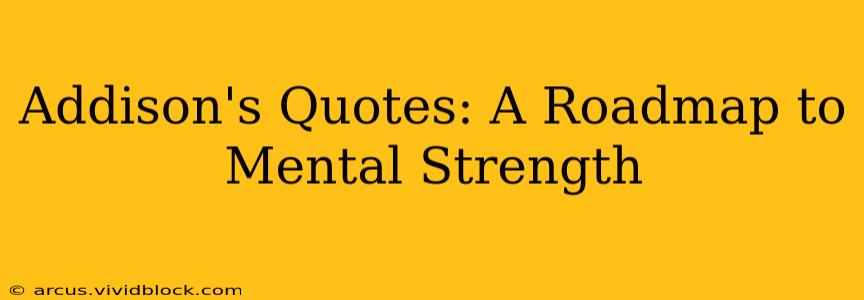Joseph Addison, the renowned 18th-century essayist and poet, penned words of wisdom that continue to resonate today. His insightful observations on human nature and the pursuit of virtue offer a surprisingly relevant roadmap to building mental strength. While not explicitly focused on modern concepts of mental well-being, his quotes provide a framework for cultivating resilience, self-awareness, and a positive outlook – essential components of mental fortitude. This exploration delves into some of Addison's most impactful quotes and reveals their timeless application to achieving mental strength in the 21st century.
Understanding Mental Strength in the Context of Addison's Time
Before we dive into specific quotes, it's important to understand the context. Addison lived in a vastly different era, but the core human struggles he addressed – dealing with adversity, finding meaning, and managing emotions – remain universal. His approach focused on moral philosophy and self-improvement, emphasizing the cultivation of virtuous character as a means of achieving inner peace and strength. This aligns surprisingly well with modern approaches to mental well-being, which emphasize self-compassion, emotional regulation, and a focus on positive values.
Addison's Quotes and Their Application to Mental Strength
While a comprehensive collection of Addison's works would reveal countless insights, let's focus on key themes and how they translate into practical strategies for building mental strength:
"The greatest pleasure in life is love."
This simple yet profound statement highlights the importance of human connection in building mental resilience. Strong social support networks act as buffers against stress and adversity. Nurturing loving relationships, both romantic and platonic, provides a sense of belonging, reduces feelings of loneliness, and boosts overall well-being – crucial elements of mental strength. Actively cultivating and maintaining positive relationships is a direct application of this quote to modern life.
How can Addison's writings help me cope with stress?
Addison's writings, though not directly addressing modern stress management techniques, offer a framework for coping. His emphasis on virtue, reason, and self-control provides a philosophical underpinning for managing emotional responses to stressful situations. By cultivating self-awareness and practicing mindful reflection (as suggested indirectly through his emphasis on self-improvement), individuals can develop coping mechanisms to navigate stressful events more effectively. His focus on finding joy in simple things also promotes a more positive outlook, lessening the impact of stress.
What are some practical exercises based on Addison's philosophy?
Practical exercises inspired by Addison's philosophy include journaling to cultivate self-awareness and identify negative thought patterns, practicing mindfulness and meditation to develop self-control, and engaging in acts of kindness and generosity to foster positive emotions and strengthen relationships. These actions reflect his emphasis on virtue, reason, and positive human interaction. The key is to apply his philosophical framework to daily life through intentional actions.
Are there any modern parallels to Addison's ideas on mental strength?
Modern psychology strongly supports Addison’s implicit understanding of mental strength. Concepts like positive psychology, which emphasizes strengths and virtues, directly mirror Addison’s focus on self-improvement and virtuous living. Cognitive Behavioral Therapy (CBT), a widely used therapeutic approach, utilizes techniques such as cognitive restructuring (challenging negative thought patterns) that align with the principles of reason and self-control found in Addison's writings. The emphasis on social support networks in modern mental health practices also echoes Addison’s appreciation for the importance of love and human connection.
"To be virtuous is to be happy."
This quote emphasizes the intrinsic connection between moral behavior and well-being. Acting with integrity, compassion, and self-respect fosters a sense of purpose and self-worth, which are fundamental to mental strength. Engaging in virtuous acts, such as helping others or pursuing meaningful goals, contributes to a greater sense of fulfillment and resilience in the face of challenges. This aligns with modern research demonstrating the positive impact of altruism and purpose on mental health.
Conclusion: A Timeless Legacy
Joseph Addison's writings, while rooted in a different era, offer enduring wisdom for cultivating mental strength. By understanding the underlying principles of self-awareness, virtue, and social connection embedded in his work, we can develop practical strategies for navigating the challenges of modern life and building resilience. His emphasis on inner peace and contentment, achieved through virtuous living, remains a powerful and timeless message for anyone seeking mental well-being. By applying these insights, we can unlock the potential for mental strength found within Addison's enduring legacy.

